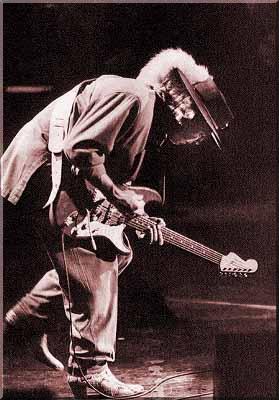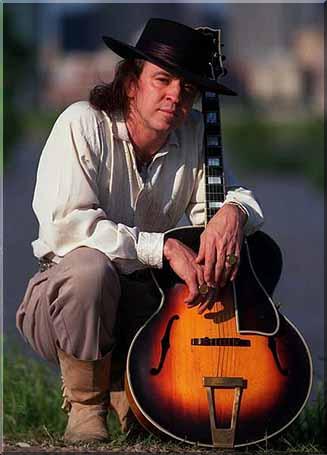 |
 Pride and Joy (ra-file, 638 kb) |
No one who crossed paths with Stevie Ray Vaughan or his music could fail to be enriched by the experience.A kid with his first electric guitar, friends who knew him through good
times and bad, even the blues legends he modeled himself after he had a
profound effect on them all. To be sure, he was a Guitar Hero in the truest
sense of the term (winning eight Guitar Player Readers Poll awards in six
years), but the essence of the Texans's playing lay not in dash or technique,
but in the heart and soul he infused into every lick. |

Musically and socially, what he and Double Trouble did was virtually
unprecedented. Not since Eric Clapton or Johnny Winter had a bonafide guitar
hero surfaced playing stone blues. In fact, there had been a shortage of guitar
heroes, period. Whereas Clapton and Winter reached their largest audiences
after they had strayed from the genre, and Hendrix had from the outset
transformed his blues base into a horse of a different color, Vaughan
faithfully played the music he'd learned from T-Bone Walker, Freddie King,
Albert King, and Guitar Slim, in front of thousands night after night. |

Howlin' Wolf's guitar virtuoso, Hubert Sumlin, says: "That was a
friend of mine, partner - one of the best. I been knowing Stevie a long time,
since he was a kid - him and Jimmie. I played with them so many times in Austin
when Antone's had the first club on 6th and Brazos. I'll tell you the truth:
That boy was something else, man. I feel like he was one of the greatest guys
and guitar players who ever lived. And he was really just getting to do his
thing. He bought a Rickenbacker for me about 10 or 12 years ago, but somebody
stole it. Then he found the guitar somewhere in New York, years later. I was
playing at Antone's, and here comes Stevie with the same guitar." |

Another collaborator in some legendary onstage shootouts was Albert
Collins. "We jammed many times, and I had so much fun," the fellow
Texan remembers. "I really miss him. He did some Jimi Hendrix, some Albert
King, a little of me, but he had it together for what he wanted to do. He had a
direction, and he made it work. The kids really liked his fire." |

Stevie seemlessly incorporated Lonnie's style, especially on
instrumentals such as "Travis Walk" and "Scuttle Buttin'."
"That's all that 9th stuff, which was like an old song of mine, 'Chicken
Pickin',' and a lot of my songs," nods Mack. "Anytime he'd do a song
like that, he'd call me up and say, 'listen to this. I'm using it again.' He
was quite a guy." |

| "Stevie told me how his brother Jimmie had learned a bit before him, and he kept hearing this record of mine. His brother wouldn't let him listen to it, so he went and stole it. He said,'These are the licks I want.' We laughed about that the night of his tragedy. I'll never forget some of the licks he was playing the last night. I think it was one of his best nights ever. They invited me up as a guest and said we were gonna jam. They all looked at me to see what we were going to play to. I said, 'Man, we all should know something about "Sweet Home Chicago."' That's what we did." |

Blues Jam with Buddy Guy (ra-file, 4 meg!!! - it's 25 minutes!) |
For a recent taping of Austin City Limits, Buddy was backed by part of
his own Chicago band and Double Trouble's Chris Layton and Reese Wynans, and in
mid-set the group played "Mary Had A Little Lamb" and "Leave My
Girl Alone," two of Buddy's songs that Stevie recorded. |

© 1997-2008 www.corax.com - All rights reserved